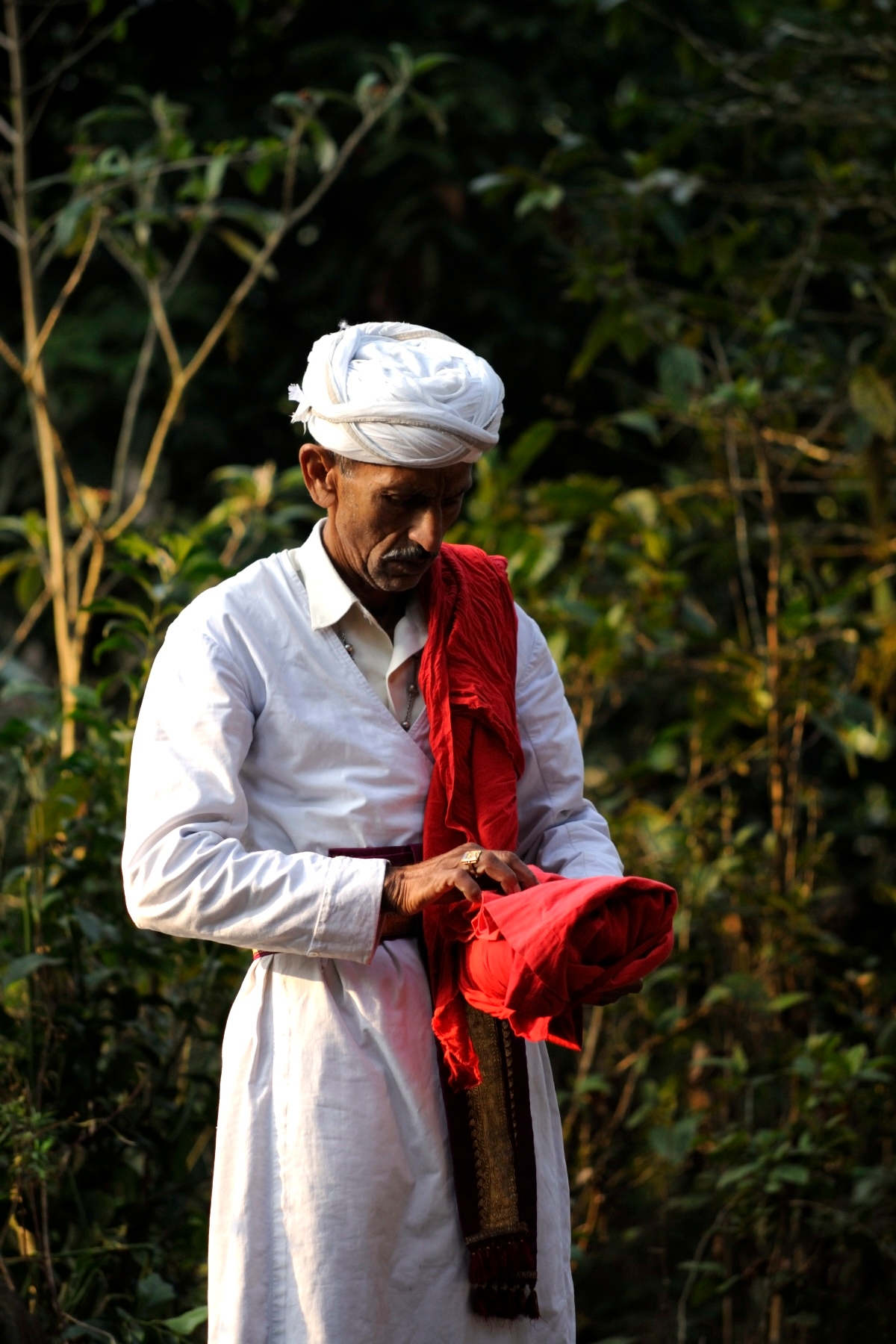WORDS AND PHOTOGRAPHY BYKaveri Ponappa
We drove out of Kodagu, my father and I, leaving behind us a magnificent ring of ethereal hills drenched in the history of our ancestors. Kotebetta—part of Kodagu’s sacred landscape—its rugged, fortress-like appearance after which it is named was a soft, delicate blue in the early morning distance.

Home to a hilltop shrine where men, women and children gather twice a year, scrambling up steep slopes skirting shola forests, crossing high grasslands with offerings of rice and produce from their fields to worship, sing, dance and give thanks, the bulky, flattened peak followed us, glimpsed through the trees as the road twisted and turned, reminding us that we must return. By the time we reached the Nilgiris, shifting mists and a thick darkness had engulfed the mountains, and Wellington was a golden haze, elusive firefly lights with blurry edges, dotting the distance. The other-worldly blue that spread across the horizon the next morning was what Rebecca Solnit writes of as “the colour of longing for the distances you never arrive in…the colour of an emotion, the colour of solitude and desire…”.
A colour that would take hold of my imagination, mesmerizing, unreachable.
Over the next several years, this new yet familiar landscape became an oddly inverted lens through which my relationship with my native Kodagu, part of the same chain of the Western Ghats, deepened. My father and I were bound by a love for the outdoors, walking, literature, and, above all, Kodagu. In the Nilgiris, we walked, covering great distances, using little-known old paths, fording cold streams, and skirting lakeshores over springy beds of peat. Walking became a way of learning a landscape and all that it held, looking always towards that elusive blue horizon.

Decades later, I set out on a solitary passage across the hills that are home. I was researching a book on the history and cultural heritage of the Kodava people, searching for a Kodagu that still existed, but was slipping further away as I watched. It was a quest for our collective past, for the events and experiences that had shaped our identity. Our memories remain embedded in these hills. In sacred groves and hilltops, isolated forest shrines, as a witness to ceremonies propitiating ancestors, spirit possessions, ancient war dances and encounters with oracles, I watched and listened as stories of the land unfolded. It was a view into a world of masked and costumed spirit-mediums who prophesy and heal, of ancestors who protect and guide, a very old way of life trying to coexist with modernity. Sometimes, histories lay in memorial stones scattered in the mountain wilderness, honouring the dead heroes of the land. At others, it was just the name of a peak or grassland that lingered in folk memory as the site of a violent battle. All the while in the presence of otherworldly beauty.
The two questions Robert Macfarlane poses of strong landscapes are the ones that colour my relationship with these hills: “…what do I know when I am in this place that I can know nowhere else? And then, vainly, what does this place know of me that I cannot know of myself?”

The Kodavas, historically a warlike hill people with a tradition of farming, hunting and ancestor worship are believed to have migrated to and settled in the Western Ghats of Kodagu. The many theories around their origins remain nebulous and unsubstantiated. Structured into patrilineal descent groups they had a strong tradition of oral transmission of culture through song, now broken. As one of the smallest ethnic groups in the world, with a distinctive culture, speaking a language now listed by UNESCO as “definitely endangered”, the survival of their identity is a matter of great concern to the community. Elders, I found, when I went into the villages, were anxious to share their knowledge before it was lost, irretrievably. A sea of thoughts clustered around these facts and informed my work which would last far longer than I could ever have anticipated.



I began my journey at a forest shrine dedicated to the god of the hunt close to Mandalpatti, a ridge that looks back at the western hills of Kodagu where the river Kaveri rises, and east to the imposing bulk of Kotebetta. The invocations to this archaic god of the wilderness who roams forests with his pack of hunting dogs began after midnight, a snaking line of dancers keeping up a steady rhythm until dawn broke through the forest trees surrounding the shrine. Pushpagiri peak rises to the Northwest, presiding over turbulent waves of purple and blue peaks swathed in great clusters of pink-tinged clouds, looking down on a patina of green forests and fields that lies across the land, close-set, like moss— if this is not heaven, it is surely halfway there. Kodagu’s sense of place is imprinted with centuries of living in, walking across and drawing an existence from the wilderness, investing it with sacredness.
The land itself, in our old beliefs, is held in trust for the river goddess Kaveri. As caretakers on her behalf, we farm and till the land, then invite the goddess to inspect our fields, seeking her approval and blessing. The forests, until the coming of colonial coffee plantations in the mid-19th century, were sacrosanct and pristine. As our stories grow old, replaced by new mythologies that no longer draw from the same wellsprings of self-knowledge and respect for the delicate balance of life, how much of our inheritance will remain for the generations ahead?
The land itself, in our old beliefs, is held in trust for the river goddess Kaveri. As caretakers on her behalf, we farm and till the land, then invite the goddess to inspect our fields, seeking her approval and blessing. The forests, until the coming of colonial coffee plantations in the mid-19th century, were sacrosanct and pristine. As our stories grow old, replaced by new mythologies that no longer draw from the same wellsprings of self-knowledge and respect for the delicate balance of life, how much of our inheritance will remain for the generations ahead?

Mandalpatti is now pockmarked and furrowed with the tracks of jeeps that ferry the mass of humanity that comes to enjoy the vistas, consuming them with terrifying ferocity. Three years ago, not far from where a large cluster of memorial hero stones lie scattered sunk into the soil, overgrown with grass and lichen, commemorating the dead warriors of local clans, a great flowering of aarli (Strobilanthes ciliates) which blooms once in seven years happened, painting the hillsides in a haze of mauve, fading to silvery lilac, glorious even as it withered and disappeared. In some sense, it conveyed all the beauty, grief, and loss of our heritage.

“What can I say of this wonderful wilderness…the pen trembles at its mention alone”, wrote Mir Hussain Ali Khan Kirmani in the late 18th century, describing a “wild country…as beautiful as the garden of Paradise”, its roads and paths “as confused as the lines of the galaxy”. This wild beauty, now inexorably stripped and tamed, made an indelible impression on the Kodava imagination. Rivers, hills and forests were all venerated. Sacred streams teemed with fish which were not trapped and uncounted meadows, hillocks and grasslands dedicated to nature spirits were scattered across the land. Surrounded by abundance, preserving and protecting the land informed every rule for farming and hunting, acknowledging the deep interconnectedness of all life. Extensive stretches of sacred groves, now reduced to a few sparse acres each, leave an impression that all of Kodagu was once, a vast open air shrine, a great, collective evocation of nature.
The beauty of Kodagu is a wounding kind. It snags your soul and lays bare all your defences. It seeps into the imagination, and made poets of clans of rough warriors, every man a dudipatkara—a poet and singer—who composed and sang long narrative songs to the beat of a small, hand-held drum. Over uncounted generations the hills echoed with voices singing while walking from place to place, continually invoking the landscape: river, hill, meadow, grove, valley, ford and pass. The songs celebrated battles, feuds, tales of love, sorcery and magic, the heroes of the land and a way of life that, in the 21st century, is disappearing swiftly as the land itself succumbs to relentless pressure.
In my travels, the narrow roads that crisscrossed the hills and valleys of Kodagu seemed endless, tapering eventually, inevitably, to footpaths framed by blue hills—that colour of unquenchable longing and desire. The place itself appeared limitless, filled with the vast silences of the gaps in our history and magnificent, untouched vistas that robbed you of speech. It was difficult to imagine how small its geography was in reality, how vulnerable to change. As progress ruthlessly flattens out the world, what I seek draws further away. I persist, although it often eludes me, sometimes heartbreakingly. The distant hills have become a metaphor for this seeking and I recognize the need—perhaps we are all, in Pablo Neruda’s words, travellers who “come from far away, from that which is behind us and within us.” I am compelled to “…return to my country and once more to go wandering in the night and dawn of my native land.”


Text and images© Kaveri Ponnapa.
Photographs reproduced with permission from The Vanishing Kodavas ©
